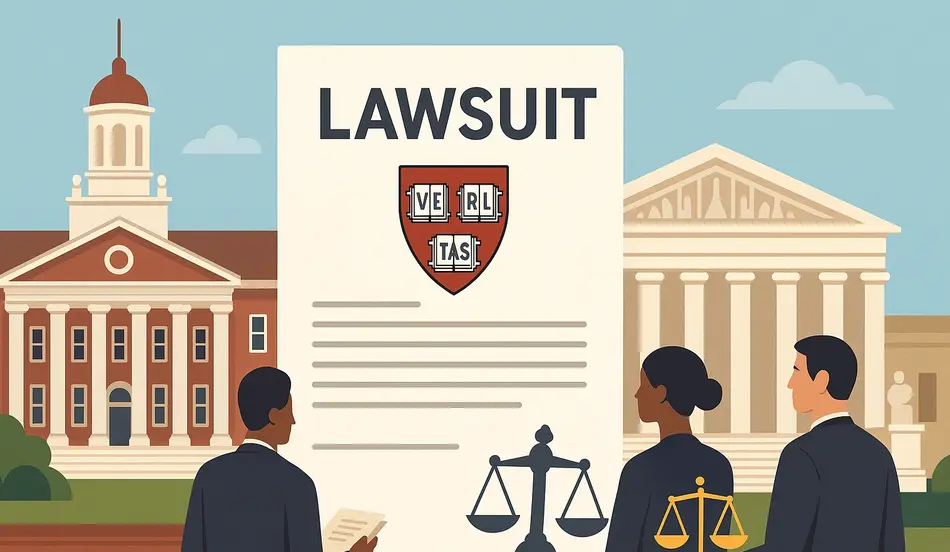The Harvard funding battle has intensified as the prestigious university argues in federal court that the Trump administration’s attempt to withhold $2.6 billion violates First Amendment rights, while government lawyers claim anti-Semitism on campus justifies the unprecedented financial penalty.
Understanding the Harvard Funding Battle: Constitutional Rights vs. Government Authority
The Harvard funding battle has emerged as a landmark case that could reshape the relationship between the federal government and academic institutions across America. At its core, this legal confrontation pits constitutional protections against administrative authority in ways that may have far-reaching consequences for universities nationwide.
Harvard University, one of America’s oldest and most prestigious educational institutions, found itself in federal court defending against the Trump administration’s decision to freeze approximately $2.6 billion in federal funding. The university’s legal team presented arguments centered on two primary claims: that the administration’s actions constitute a violation of First Amendment rights, and that the process used to implement the funding freeze failed to follow proper administrative procedures.
“What happened in court today is that I think it was a good day for Harvard,” noted CBS News legal contributor Jessica Levinson, who observed that the presiding judge appeared “sympathetic to Harvard’s case” during questioning. This judicial reception suggests the university’s constitutional arguments may be gaining traction in the courtroom.
The Constitutional Foundation of Harvard’s Defense
Harvard’s legal strategy in the Harvard funding battle rests significantly on First Amendment protections that have historically shielded academic institutions from government interference based on speech or expression. The university contends that the Trump administration is effectively punishing the institution for either statements made on campus or for refusing to make certain statements demanded by government officials.
This constitutional argument touches on fundamental questions about academic freedom:
- Can the government withhold funding based on speech it finds objectionable?
- Does the First Amendment protect a university’s right to determine its own policies on expression?
- Where is the line between legitimate government oversight and unconstitutional coercion?
These questions make the Harvard funding battle more than just a dispute over money—it represents a potential watershed moment for defining the limits of government authority over educational institutions.
The Trump Administration’s Position in the Harvard Funding Battle
The administration’s legal team has framed the Harvard funding battle in markedly different terms, characterizing it primarily as a contractual dispute rather than a constitutional crisis. Government lawyers argued that Harvard had failed to maintain policies consistent with federal requirements, particularly regarding responses to allegations of anti-Semitism on campus.
The Contract Compliance Argument
According to the Trump administration’s position, the funding freeze represents a legitimate response to Harvard’s alleged breach of contractual obligations with the federal government. Their argument hinges on the premise that:
- Federal funding comes with specific compliance requirements
- Harvard failed to adequately address anti-Semitism on campus
- This failure constitutes a breach of the university’s obligations
- The government has the authority to withhold funding in response
This contractual framing attempts to sidestep the constitutional questions raised by Harvard, positioning the Harvard funding battle as a straightforward matter of enforcement rather than a First Amendment issue.
Explore Education Policy Career Opportunities
Related Post: Explore Top Jobs on WhatJobs
- Find positions in educational policy development and administration
- Discover opportunities in university legal affairs departments
- Access job listings in government relations for academic institutions
- Connect with employers seeking expertise in higher education compliance
- Receive alerts for positions matching your educational policy experience
Judicial Skepticism and Political Context in the Harvard Funding Battle
The Harvard funding battle has been further complicated by the political context surrounding the case. Before the court even rendered a decision, former President Trump publicly criticized the presiding judge, announcing his intention to appeal any unfavorable ruling.
This preemptive criticism appears to reflect Trump’s assessment of the courtroom dynamics. As Levinson observed, “I think the President saw what the rest of us saw, which is that this is a judge who was pretty dubious of the Trump administration’s position… I think this is the President laying the groundwork for what he thinks will be a loss in federal court.”
The Administrative Procedures Act Challenge
Beyond the constitutional questions, Harvard has also challenged the administration’s actions under the Administrative Procedures Act (APA), arguing that the government failed to follow proper procedures when implementing the funding freeze. This technical but crucial aspect of the Harvard funding battle focuses on whether the administration:
- Provided adequate notice before taking action
- Allowed for appropriate comment periods
- Followed established protocols for funding decisions
- Acted arbitrarily or capriciously in targeting Harvard
The judge’s questioning suggested potential receptiveness to these procedural arguments, which could provide grounds for ruling against the administration even without directly addressing the more complex First Amendment issues.
Potential Settlement Prospects in the Harvard Funding Battle
Despite the high-stakes nature of the Harvard funding battle, there has been speculation about the possibility of settlement. As Levinson noted, “There’s nothing that motivates parties to settle like the eve of trial, which is essentially what happened today.”
However, the path to settlement remains unclear. Harvard has established a September 3rd deadline for resolution, arguing that delays beyond this point could make it impossible to recover the withheld funding. This timeline creates additional pressure on both parties to either reach agreement or commit fully to litigation.
Factors Complicating Settlement Efforts
Several factors make settlement of the Harvard funding battle particularly challenging:
- Political symbolism: The case has become emblematic of larger cultural and political disputes
- Precedential concerns: Any settlement could influence how similar cases are handled in the future
- Institutional principles: Both sides may view compromise as undermining core values
- Public scrutiny: The high-profile nature of the case means any settlement will face intense examination
These complications suggest that despite potential mutual interest in avoiding prolonged litigation, finding common ground may prove exceptionally difficult in the Harvard funding battle.
Broader Implications of the Harvard Funding Battle for Academic Freedom
The Harvard funding battle extends far beyond the specific dispute between one university and the federal government. Its outcome could establish precedent affecting academic institutions nationwide, potentially reshaping the relationship between higher education and federal oversight for generations.
Potential Consequences for Universities
If the Trump administration prevails in the Harvard funding battle, other universities might face:
- Increased vulnerability to funding cuts based on campus speech
- Greater pressure to adopt specific policies to maintain federal funding
- Reduced institutional autonomy in addressing controversial issues
- Heightened scrutiny of campus activities and statements
Conversely, a victory for Harvard could strengthen protections for academic freedom and limit the government’s ability to use funding as leverage to influence university policies and practices.
For more information on how federal funding impacts higher education, visit the American Council on Education’s government relations page, which tracks legislative and regulatory developments affecting universities.
Hiring for AI or Tech Roles?
Post jobs for free with WhatJobs – Reach top AI and tech talent now!
Post a Job Now →The Procedural Timeline and Next Steps in the Harvard Funding Battle
The current phase of the Harvard funding battle involves what’s known as a motion for summary judgment, where both parties have asked the court to rule on legal questions without proceeding to a full trial. As Levinson explained:
“This was a motion for summary judgment, meaning Harvard is saying, and the Trump administration is saying, we don’t need a jury. We don’t need fact finders here. We can let the judge decide, because the legal standard is there’s no genuine dispute about the material facts.”
Critical Upcoming Deadlines
Several key dates will shape the progression of the Harvard funding battle:
- September 3rd: Harvard’s stated deadline for resolution before funding becomes unrecoverable
- Fall semester start: When funding issues would begin directly impacting university operations
- Potential appeal timeline: If either party appeals, the case could extend for months or years
These deadlines create a sense of urgency around the case, particularly for Harvard, which faces significant operational challenges if the funding freeze continues into the academic year.
Historical Context for Government Intervention in Higher Education
While the Harvard funding battle represents an escalation in tensions between the federal government and universities, it builds upon a complex history of federal involvement in higher education. From the establishment of land-grant universities in the 19th century to the expansion of research funding during the Cold War, the relationship between academia and government has always involved both support and oversight.
However, direct intervention based on campus speech or policies represents a significant departure from traditional approaches. Previous disputes have typically focused on specific research programs or compliance with civil rights laws rather than broader institutional policies or campus climate issues.
For a deeper understanding of the historical relationship between the federal government and universities, the American Association of University Professors’ resource page on academic freedom provides valuable context on how this relationship has evolved over time.
The Role of Social Media and Public Opinion in the Harvard Funding Battle
The Harvard funding battle has unfolded in an era of intense social media scrutiny, with public opinion playing a significant role in shaping both the legal and political dimensions of the case. Campus incidents that might once have remained local matters now quickly become national news, amplified through social platforms and partisan media outlets.
This heightened visibility has several implications for the Harvard funding battle:
- Increased political pressure on both the university and government officials
- Greater difficulty in reaching compromise solutions away from public view
- Risk of conflating legal issues with broader cultural and political disputes
- Challenges in communicating nuanced legal positions to public audiences
For both Harvard and the Trump administration, navigating these public dimensions adds another layer of complexity to an already multifaceted legal confrontation.
Legal Precedents and Potential Outcomes of the Harvard Funding Battle
The Harvard funding battle touches on several established legal precedents regarding academic freedom and government authority. Courts have historically granted significant deference to universities in matters of academic policy while also recognizing legitimate government interests in ensuring proper use of federal funds.
Possible Judicial Outcomes
Several potential resolutions to the Harvard funding battle could emerge from the current proceedings:
- Ruling for Harvard on constitutional grounds: Finding that the funding freeze violates First Amendment protections
- Ruling for Harvard on procedural grounds: Determining that the administration failed to follow proper procedures
- Ruling for the government: Upholding the funding freeze as a legitimate exercise of authority
- Partial ruling: Addressing some aspects while leaving others for further litigation
- Remand for further proceedings: Sending the case back for additional fact-finding or procedural steps
Each of these outcomes would carry different implications for the future relationship between universities and the federal government, potentially establishing new parameters for when and how funding can be used as leverage for policy changes.
For more analysis of how federal courts have addressed similar issues in the past, the Foundation for Individual Rights and Expression’s legal database offers comprehensive resources on academic freedom jurisprudence.
FAQ About the Harvard Funding Battle
What is at the core of the Harvard funding battle with the Trump administration?
The Harvard funding battle centers on the Trump administration’s attempt to withhold $2.6 billion in federal funding from the university. Harvard argues this action violates the First Amendment by targeting the institution based on speech or expression on campus, while also claiming the administration failed to follow proper procedures under the Administrative Procedures Act. The government counters that Harvard has violated contractual obligations by inadequately addressing anti-Semitism on campus, framing the Harvard funding battle as a matter of contract compliance rather than constitutional rights. The case could establish significant precedent for government authority over academic institutions.
How could the Harvard funding battle impact other universities across America?
The Harvard funding battle could have far-reaching consequences for universities nationwide. If the government prevails, institutions might face increased vulnerability to funding cuts based on campus speech and activities, potentially compromising academic freedom. Universities would likely face greater pressure to adopt specific policies to maintain federal funding and experience reduced institutional autonomy in addressing controversial issues. The Harvard funding battle essentially tests whether the government can use financial leverage to influence university policies and practices, potentially creating a precedent that would reshape the relationship between higher education and federal oversight for generations.
What legal arguments is Harvard making in the Harvard funding battle?
In the Harvard funding battle, the university is advancing two primary legal arguments. First, Harvard contends that the Trump administration’s actions violate the First Amendment by targeting the institution based on speech or the refusal to make certain statements, framing this as unconstitutional government coercion. Second, Harvard argues that the administration violated the Administrative Procedures Act by failing to follow proper procedures when implementing the funding freeze, including inadequate notice and arbitrary decision-making. Legal observers noted that during court proceedings, the judge appeared receptive to Harvard’s arguments, particularly questioning the government’s characterization of the Harvard funding battle as merely a contractual dispute rather than a constitutional issue.
What timeline and deadlines are critical in the Harvard funding battle?
The Harvard funding battle faces several critical deadlines that increase pressure for resolution. Harvard has established September 3rd as a crucial deadline, arguing that if the funding freeze isn’t resolved by then, the university may be unable to recover the withheld $2.6 billion. This timeline coincides with the start of the fall semester, when the financial impact would begin directly affecting university operations. The current legal phase involves motions for summary judgment, where both parties have asked the court to rule on legal questions without proceeding to a full trial. If either party appeals the decision, the Harvard funding battle could extend for months or even years, creating significant operational uncertainty for the university.
Conclusion: The Stakes of the Harvard Funding Battle for American Higher Education
The Harvard funding battle represents more than just a dispute between one university and the federal government—it embodies fundamental questions about academic freedom, government authority, and the proper relationship between political power and educational institutions in American society.
As this case proceeds through the courts, its resolution will likely establish important precedents affecting:
- The extent of First Amendment protections for universities
- The government’s ability to use funding as leverage for policy changes
- Procedural requirements for administrative actions affecting educational institutions
- The balance between addressing legitimate concerns about campus climate and preserving institutional autonomy
For universities, students, faculty, and policymakers alike, the outcome of the Harvard funding battle will shape the landscape of higher education for years to come, determining the boundaries of both academic freedom and government oversight in an increasingly polarized political environment.




